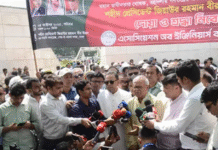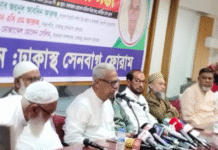ANFREL questions EC’s sincerity to hold transparent polls
 The Asian Network for Free Elections (ANFREL) has criticised Bangladesh’s election commission for creating hurdles for observers from home and abroad who were interested in monitoring the 30 December parliamentary polls.
The Asian Network for Free Elections (ANFREL) has criticised Bangladesh’s election commission for creating hurdles for observers from home and abroad who were interested in monitoring the 30 December parliamentary polls.
In a press statement issued on Sunday, ANFREL explained the reasons why it withdrew the polls observation mission on 22 December.
It blamed “significant delays” in the accreditation approval by the election commission and visa approvals by the foreign affairs ministry.
“With ANFREL’s withdrawal, the organisation registers its doubts regarding the integrity of the elections, especially with the reports on civil society restrictions and arrest of numerous opposition members,” it said.
The polls observation group maintained that the presence of election observers is a crucial indicator of the level of transparency and public confidence in the elections.
“Placing hurdles for observers to access information, restricting their movement, and hindering them from performing their mandate to promote democratic practices calls into question the sincerity of the Bangladesh authorities to hold transparent elections,” ANFREL added.
It stated that it submitted all necessary accreditation requirements to the election commission by 26 November 2018 whereas as of 21 December, a mere nine days before the elections, ANFREL was granted accreditation for only 13 of its observers out of the 32 applications.
“We regret that this situation hindered us from directly working with the Bangladesh election stakeholders, which ANFREL has been looking forward to,” the network said and condemned all actions that “impede the freedoms of civil society organisations.”
However, ANFREL called on all domestic stakeholders to collectively ensure secure and peaceful elections, using every opportunity to mitigate violence—no matter the outcome of the election.
“We ask the Bangladesh government and the BEC [election commission] to enforce the rule of law impartially and to ensure the safety and security of all electoral stakeholders,” according to the statement.
Furthermore, ANFREL called on the political parties to abide by a code of conduct which befit the dignity of future leaders.
In its statement, ANFREL expressed dismay with the manner in which the Bangladesh authorities have handled the accreditation application process for domestic and international election observers.
It mentioned that while the EC took initiatives to welcome intergovernmental organisations, non-governmental organisations such as the ANFREL and several domestic monitoring groups either faced significant delays in their accreditation or were barred altogether from monitoring the upcoming elections.
ANFREL is among the endorsers of the Declaration of Principles and Code of Conduct for International Election Observers (DOP).
“With ANFREL’s withdrawal, no DOP-endorsing organisations will monitor the upcoming elections in Bangladesh,” it said.
ANFREL mentioned that other member organisations of the Global Network of Domestic Election Monitors (GNDEM) have also been denied accreditation by the EC due to “allegations of partisanship or their association with human rights groups and independent election monitoring networks”.
ANFREL expressed its concern at the denial of accreditation applications from a high number of domestic election observers.
As only around 26,000 observers would be granted accreditations, the statement pointed out that the 2018 election “marks the second lowest number of observers in two decades”, just behind 2014 elections where only 8,878 domestic observers and four foreign observers participated.
In comparison, there were around 159,000 observers for the 2008 elections, and 218,000 in 2001, ANFREL recalled.
ANFREL still extended its solidarity with the Bangladeshi civil society actors as they bravely perform their duties, especially in this tense campaign.
“We express support in their advocacy to achieve truly participatory and inclusive political processes in Bangladesh,” read its statement.









